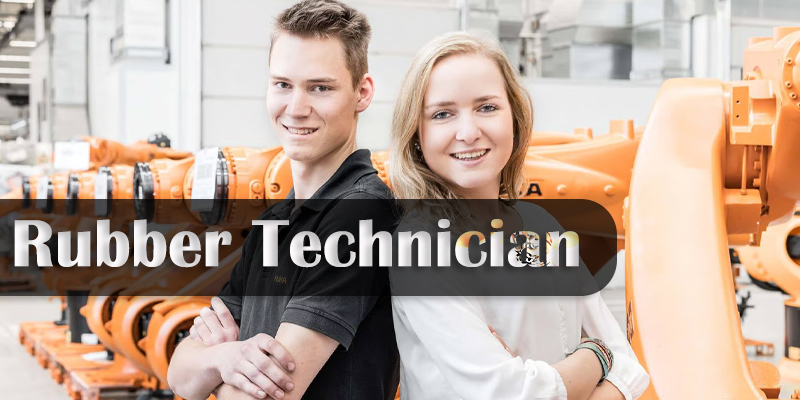
ITI Rubber Technician Syllabus
Course Overview
-
Trade Name: Rubber Technician
-
Duration: 1 Year (2 Semesters)
-
NSQF Level: Level 4
-
Eligibility: 10th Grade Pass with Science and Mathematics
-
Objective: To train candidates in the processing, manufacturing, and testing of rubber products, preparing them for roles as rubber technicians, machine operators, or self-employment in rubber industries such as tire manufacturing, automotive parts, and polymer processing.
-
Certification: National Trade Certificate (NTC) by NCVT
Detailed Syllabus
Semester 1
Trade Theory
-
Introduction to Rubber Technology: Overview of rubber industry, natural vs. synthetic rubber, applications (tires, belts, seals).
-
Safety Practices: PPE (gloves, masks, safety shoes), chemical handling, fire safety, ventilation in rubber workshops.
-
Raw Materials: Types of rubber (NR, SBR, NBR), compounding ingredients (carbon black, sulfur, accelerators).
-
Rubber Properties: Elasticity, tensile strength, hardness, abrasion resistance; effect of compounding.
-
Mixing Processes: Open mill mixing, internal mixers (Banbury), compounding procedures.
-
Basic Machinery: Two-roll mills, kneaders, extruders; components, operation, and setup.
-
Vulcanization Basics: Principles of curing, sulfur vs. peroxide systems, curing time and temperature.
Trade Practical
-
Safety Drills: Wearing PPE, handling chemicals safely, practicing emergency evacuation.
-
Material Identification: Testing rubber samples for type (NR, SBR), checking filler content.
-
Mixing Practice: Operating two-roll mill, preparing rubber compounds with specified ingredients (±1% accuracy).
-
Machine Setup: Calibrating extruder feed rate, setting mill nip gap (±0.5 mm).
-
Vulcanization Tasks: Curing rubber samples in a press, monitoring time (5-15 min) and temperature (140-160°C).
-
Testing: Measuring hardness (Shore A), tensile strength using basic testers.
-
Project Work: Prepare and cure a 300x300 mm rubber sheet with specified hardness (60±5 Shore A).
Hours: Theory: 160 hours | Practical: 240 hours
Semester 2
Trade Theory
-
Advanced Processing: Molding (compression, injection), calendaring, continuous vulcanization.
-
Rubber Products: Tires, hoses, gaskets; design and manufacturing requirements.
-
Quality Control: Testing for elongation, tear strength, aging resistance; standards (ASTM, ISO).
-
Machinery Maintenance: Troubleshooting extruders, mold cleaning, hydraulic system checks.
-
Polymer Chemistry: Molecular structure of rubber, cross-linking, effect of additives.
-
Environmental Practices: Recycling rubber waste, reducing emissions, eco-friendly compounding.
-
Entrepreneurship: Starting a rubber product unit, market trends (e.g., green tires, medical rubber goods).
Trade Practical
-
Molding Operations: Producing rubber gaskets using compression molding, ensuring defect-free edges.
-
Calendaring: Operating calendaring machine to produce thin rubber sheets (±0.1 mm thickness).
-
Advanced Testing: Conducting tear strength and aging tests, comparing results with standards.
-
Machine Maintenance: Lubricating extruder screws, replacing worn seals, checking hydraulic pressure.
-
Recycling Tasks: Processing rubber scrap into reclaim, testing its usability.
-
Product Fabrication: Manufacturing a rubber hose (500 mm length) with specified diameter (±1 mm).
-
Project Work: Design and produce a molded rubber component (e.g., O-ring), meeting ASTM quality standards.
Hours: Theory: 160 hours | Practical: 240 hours
Additional Components
-
Workshop Calculation and Science
-
Calculations: Compound ratios, curing time, production rates, material cost estimation.
-
Science: Polymer elasticity, heat transfer in vulcanization, chemical bonding in curing.
-
Hours: 80 hours/year
-
-
Engineering Drawing
-
Drawings: Rubber mold designs, machine layouts, product cross-sections (e.g., tire tread).
-
Hours: 80 hours/year
-
-
Employability Skills
-
Communication: Documenting production logs, coordinating with quality teams, client interaction.
-
IT Literacy: Using rubber testing software, inventory systems, online material databases.
-
Soft Skills: Time management, teamwork, resume writing, interview preparation.
-
Hours: 60 hours/year
-
Assessment and Certification
-
Exams:
-
Theory: Written exams per semester (MCQs, descriptive questions).
-
Practical: Operating rubber machinery, producing samples, quality testing, maintenance tasks.
-
-
Evaluation Criteria: Product quality, process accuracy, safety compliance, testing proficiency.
-
Certification: NCVT National Trade Certificate (NTC), globally recognized.
Career Opportunities
-
Employment: Rubber technician, machine operator, or quality inspector in tire manufacturing, automotive parts, or polymer industries.
-
Self-Employment: Rubber product manufacturing unit, consultancy for rubber processing, recycling ventures.
-
Further Studies: Diploma in Polymer Technology, certifications in rubber compounding or tire technology.
Source: Based on NCVT guidelines and general ITI syllabus structure for Rubber Technician trade. For the latest syllabus, refer to the official DGT website (dgt.gov.in) or Bharat Skills (bharatskills.gov.in).
Trade Type
- 17 views